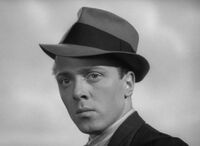Richard Attenborough: Difference between revisions
(Created page with "==Relevance== {{Page |DiscogsArtistId= |WikipediaPageTitle=Richard_Attenborough }} Category:Negative Influences on Morrissey") |
No edit summary |
||
| (3 intermediate revisions by the same user not shown) | |||
| Line 1: | Line 1: | ||
[[File:Richard Attenborough.jpg | 200px | right | thumb |Richard Attenborough]] | |||
==Relevance== | ==Relevance== | ||
[[Category:Negative Influences on Morrissey]] | |||
[[Category:Influences on Morrissey - Film and Television]] | |||
{{Page | {{Page | ||
| | |RelatedForumThreads=151874 | ||
|WikipediaPageTitle=Richard_Attenborough | |WikipediaPageTitle=Richard_Attenborough | ||
}} | }} | ||
{{PageDate}} | |||
Latest revision as of 18:58, 5 January 2024
Relevance
Mentioned In
- Headful Of Heroes - NME (September 16, 1989)
- Richard Attenborough dies - true-to-you.net (August 26, 2014)
- SHAKE THE HAND THAT SHOOK THE HAND - Morrissey Central (January 5, 2024)
Wikipedia Information
 |
Richard Samuel Attenborough, Baron Attenborough, (; 29 August 1923 – 24 August 2014) was an English actor, film director, and producer. Attenborough was the president of the Royal Academy of Dramatic Art (RADA) and the British Academy of Film and Television Arts (BAFTA), as well as life president of the Premier League club Chelsea. He joined the Royal Air Force during World War II and served in the film unit, going on several bombing raids over Europe and filming the action from the rear gunner's position. He was the older brother of broadcaster Sir David Attenborough and motor executive John Attenborough. He was married to actress Sheila Sim from 1945 until his death. As an actor, Attenborough is best remembered for his film roles in Brighton Rock (1948), I'm All Right Jack (1959), The Great Escape (1963), The Sand Pebbles (1966), Doctor Dolittle (1967), 10 Rillington Place (1971), Jurassic Park (1993), and Miracle on 34th Street (1994). In 1952, he appeared on the West End stage, originating the role of Detective Sergeant Trotter in Agatha Christie's The Mousetrap which has since become the world's longest-running play. For his directorial debut, 1969's Oh! What a Lovely War, Attenborough was nominated for the BAFTA Award for Best Direction, and he was nominated for his films Young Winston, A Bridge Too Far, and Cry Freedom. He won two Academy Awards for Gandhi in 1983: Best Picture and Best Director. The British Film Institute ranked Gandhi the 34th greatest British film of the 20th century. Attenborough also won four BAFTA Awards, four Golden Globe Awards, and the 1983 BAFTA Fellowship for lifetime achievement.
Related Forum Threads
- [Morrissey Central] "SHAKE THE HAND THAT SHOOK THE HAND" (January 5, 2024) - Morrissey-solo (Jan 06, 2024)
